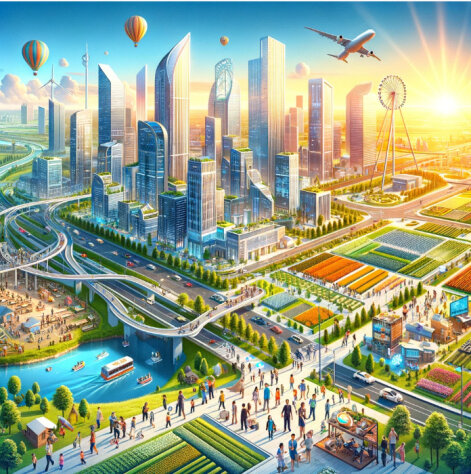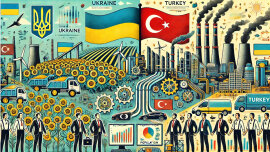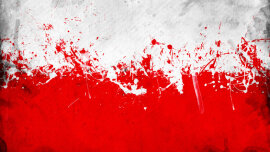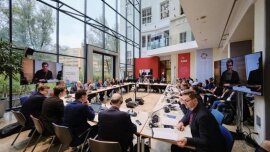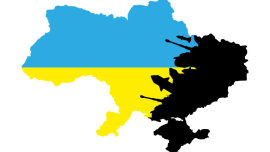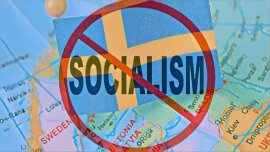Sooner or later the Russian-Ukrainian war will end. And, if the Ukrainian government retains its subjectivity, then again (once again) the question will arise: what does the economic development of countries depend on, what are the real (and not declared) reasons for success, and what needs to be done for Ukraine to develop.
In this regard, the thoughts of the modern outstanding economic historian Joel Mokyr are interesting. More recently, at the end of 2017, he wrote an article “How Europe became so rich” https://aeon.co/essays/how-did-europe-become-the-richest-part-of-the-world . It clearly and consistently sets out the reasons for the West's victory.
Let us present the main ideas of this work by Joel Mokyr and make proposals regarding future Ukrainian scientific and economic policy.
According to Mokyr, the prerequisites for Europe’s victory were the following, starting around the Middle Ages:
1) the political fragmentation of Europe, which caused interstate competition among European monarchs. For centuries, no ruler had succeeded in unifying Europe the way the Mongols and Ming emperors unified China;
2) lack of control, due to this fragmentation, over the scientific and innovation process (the impossibility of prohibiting the discovery of new knowledge and the invention of new goods, which happened more than once in the East);
3) a fairly large size of the market for new ideas and goods (science and production of goods were carried out for the whole world);
4) cultural unity of Europe (the dominant role of the Christian Church, which created a single homogeneous space in Europe - the Christian world). European cultural unity was rooted in the classical heritage and the use of Latin as a lingua franca;
5) an active and mobile community of European intellectuals who moved freely throughout the Christian world, and therefore the spread of their ideas, regardless of borders. It must be added here that the distribution of scientific and industrial books throughout all European countries also played an important role in the dissemination of ideas;
6) the skepticism of Western scientists who challenged the traditional knowledge that had dominated in Europe since the times of the ancient world, and before that had unquestioned authority in the scientific community (the ideas of Plato, Aristotle, Ptolemy, etc.). This did not happen in the East;
7)growing connection between science and practice. Practice began to rely more and more on scientific knowledge;
8) neophilia - love for new things. People involved in science and production began to be invited to the courts of those in power. Science became fashionable and scientists gained influence among elite groups.
These are the main systemic reasons, according to Joel Mokyr, that made Europe rich, as well as the region that subsequently became dominant throughout the world. And the countries of the East then had to follow the same path in order to close the gap with the West, and return to where they were before Europe overtook them in scientific and economic development.
Since these factors of development and enrichment have already worked once, it is therefore reasonable to assume that they will work again. What does this mean for Ukraine? What will it have to do to develop like the most advanced countries? In our opinion this is:
- Participate in the international competition of nations;
- To create products not for the domestic market, but for the global one. Only a large market can make innovative production profitable. There were such examples. Let's remember the global success of the Finnish company Nokia, which began as a paper manufacturer and then became the world's leading manufacturer of cell phones in the 90s of the last century;
- Initiate interest in new knowledge (exact sciences and technologies) in the country through government propaganda of the importance of science and technology. Today this is not the case;
- Create new modern scientific institutes in the field of exact sciences, providing benefits and preferences to international players (the idea of charter cities of Nobel laureate in economics Paul Romer can also be realized in relation to the creation of large scientific centers on the territory of Ukraine, the main actors of which will be foreign residents attracted to Ukraine with favorable conditions for their activities). We must become part of a vast world science, just as earlier in the Middle Ages, representatives of small European states became part of a single science in the Christian world. We must do our best to avoid provincialism in behavior;
- Use scientific skepticism as the main method of assessing the knowledge entering the country (the idea of the historian of science Karl Popper is that the best method of scientific knowledge is an attempt not to prove, but to refute (falsify) the scientific hypothesis put forward). We must be very critical of all foreign consultants who offer us their development options. Development strategies should be developed exclusively by representatives of national elites, based on all the world knowledge created up to this time. No one from the outside can be as interested in the development of Ukraine as the Ukrainians themselves;
- Pursue high ambitions in scientific and industrial activities. It was ambition that allowed Europeans to achieve so much in their time. And for this development, in relation to the more developed East, from which they received most of their ideas in the early Middle Ages, without ambition the Europeans would have had no basis. Openness, love for new knowledge and ambition allowed them to do this.
Here, in a nutshell, are the main ideas for Ukraine's future scientific and industrial ascent, based on the research and findings of the eminent economic historian Joel Mokyr. Of course, they must be carefully detailed, but the main meaning of the development is clear. If you do all this, success is not a foregone conclusion, but it certainly won’t happen if you don’t do all this.
In order to achieve all this, a genuine power elite must come to power. One of the creators of the theory of elites , the Italian Gaetano Mosca, determined what qualities the national elite should have. This:
1) Ability to manage people.
2) Organizational skills.
3) The advantages that distinguish this class in relation to other classes are moral, material and intellectual superiority.
It is clear that in the era of the triumph of electoral populism, the arrival of such an elite is extremely difficult. But if this does not happen, then the Second Ukrainian Republic will either end its existence or cease to play any role in the international competition of nations. In Ukraine, the time has come for idealists, such as the people who came to power in South Korea in the early 60s of the last century and achieved an economic miracle in a war-torn country. Idealism and correct, verified economic decisions based on world economic theory provide the only chance for Ukraine to break the deadlock.
